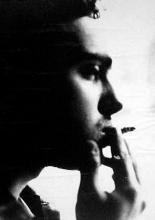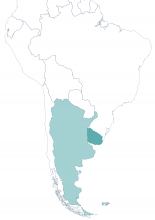Gerardo Moisés Alter was born in the city of La Plata (Buenos Aires Province - Argentina) on 10th August 1946. He studied at the Nº 1 Albert Thomas Industrial High School, where he received his diploma in motor mechanics and, later, started a degree in Architecture and Urban Planning at La Plata National University.
In 1968, he moved to Río Negro Province (Argentina), where his sister was living, to work for a construction company. He attempted to enroll at the Faculty of Architecture of Rome (Italy) that December but, due to administrative issues, he was unable to make this opportunity happen and instead decided to continue his studies in La Plata. Meanwhile, he began to involve himself in political militancy by firstly becoming an active member of the Partido Revolucionario de los Trabajadores (Workers' Revolutionary Party, PRT) before participating in the formation of the Ejército Revolucionario del Pueblo (People's Revolutionary Army, ERP) in 1970.
In 1972, different revolutionary groups from the region met in Chile, leading to the formation of the Junta de Coordinación Revolucionaria (Revolutionary Coordinating Junta, JCR): an umbrella group of leftist organisations including the Argentine Partido Revolucionario de los Trabajadores-Ejército Revolucionario del Pueblo (Workers' Revolutionary Party-People's Revolutionary Army), the Bolivian Ejército de Liberación Nacional (National Liberation Army), the Chilean Movimiento de Izquierda Revolucionario (Revolutionary Left Movement), and the Uruguayan Movimiento de Liberación Nacional -Tupamaros (National Liberation Movement, MLN-T). The alliance aimed to strengthen collaborations between different guerrilla groups across South America. In June 1973, a second JCR meeting took place in the city of Rosario (Argentina) to determine the exchange of militants between the different organisations, among other agreements.
On 11th July 1973, a few weeks after the Uruguayan coup d'état, Gerardo travelled to Montevideo to join the militancy of the MLN-T, an organisation that had been severely castigated since 1972 through the brutal repression of its members. On the morning of 19th August later that year, while Gerardo was seeking to make a contact in public, he was arrested together with the Uruguayans Walter Arteche and Jorge Selves. The three militants were transferred to the Batallón de Infantería N° 1 (N° 1 Infantry Battalion), better known as the Batallón Florida, where they were brutally tortured.
Gerardo and Walter died the same day due to the terrible torture they endured. Gerardo was dead on arrival at Montevideo's Central Military Hospital, where his passing was confirmed. His burial was arranged as an unidentified decedent at the mass grave of Montevideo's Northern Cemetery (Cementario del Norte). Several years later, his family managed to find him and repatriate his remains to be buried in Argentina.
His sister, Rosalía, filed a lawsuit before the courts for Gerardo's murder. The executive branch quickly closed the investigation, which fell under law N.º 15.848 on the Expiry of the State's Punitive Claims (Ley de Caducidad de la Pretensión Punitiva del Estado), commonly known as the "impunity law".
In October 2011, the Uruguayan courts prosecuted two former army officials for the charges and requested the arrest of Hermes Tarigo: the former director of military intelligence at the Batallón Florida who remains a fugitive from justice.
In October 2016, the prosecutors ordered that twelve military officers be tried for Alter's murder by torture. In June 2021, the officers Pedro Enrique Buzó Correa, Antranig Ohannessian, and Néstor Ramón Silvera Fonseca were sentenced. In October 2021, the courts also managed to prosecute Armando Méndez: a retired military officer and member of the Órgano Coordinador de Operaciones Antisubversivas (Coordinating Organism for Antisubversive Activities).
In the March-2022 case of Walter Arteche (murdered jointly with Alter), the Uruguayan courts sentenced to prison the retired military officers Armando Méndez Caban, Antranig Ohannessian, and Arturo Aguirre Percel. The courts decreed that Percel, who declared himself unfit to plead, undergo medical examinations to confirm whether he could be brought to court and if he should be granted the benefit of house arrest.


